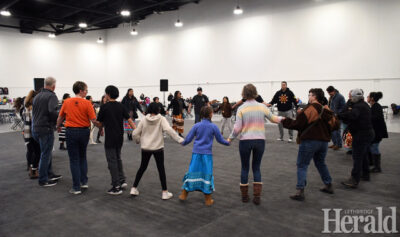Impact of racism and abuse discussed at expo
By Justin Seward - Lethbridge Herald on March 26, 2024.
 Herald photo by Justin Seward
A round dance helped conclude the Walking Together Expo on Saturday at the Agri-Food Hub and Trade Centre.
Herald photo by Justin Seward
A round dance helped conclude the Walking Together Expo on Saturday at the Agri-Food Hub and Trade Centre.Social epidemiologist Cheryl Currie talked about the impact of racism and abuse for Indigenous people during the Honouring Traditions and Reconciliation Society’s Walking Together Expo at the Agri-Food Hub and Trade Centre on Saturday.
“I published many, many studies now showing that Indigenous people in Alberta are experiencing racism at a level that is higher than African Americans (in the) United States”said Currie, who serves as an associate professor of public health at the University of Lethbridge.
“Extremely high levels of racism and what I’ve been showing in my research is that is changing their endocrine system, changing their physiology . So that they’re constantly in the state of fight or flight.”
Currie emphasized the stress of racism, abuse and residential schools has an impact on the physiology of people in ways it could lead to diabetes and other problems.
“If you have at least one adult in your life as a kid who you can turn to for self-soothing, your body starts to learn that this environment is a safe place to grow up and our stress response does not need to be through the roof all the time,” said Currie.
“But is that the world that all children grow up in, that they have a safe adult to turn to? No. So what happens to the child’s stress response when they grow up in an environment like this? I’m from Winnipeg. What’s the child going to do, go live in a snowbank at minus 40, there’s nowhere to run? They can’t fight, they’re just children.
“What happened in the residential schools, it’s the same thing. So what happens to children in these situations growing up with a lot of abuse, a lot of a neglect is in the scientific neuroscience field, we say the child switches from the learning brain to the survival brain. Their brain can’t pay attention, it has to be hyper vigilant looking for lions. All the adults in their lives are dangerous.”
Currie spoke about the Adverse Childhood Experience (ACE) score and how when you hit four that is when stress response problems start to occur.
“We see problems with your health when you’re older,” said Currie.
“As soon as you hit four or higher, we see more cancer, more diabetes, more substance misuse, more depression because once you hit four there’s not enough support for you to have a strong learning brain. Some of you were switching to a survival brain to survive your childhood.”
Currie said unfortunately when research is looked at for Indigenous people in Canada and other countries, there are very high levels of racism and bullying in school.
“So what happens to kids in these situations is their body is very out of control, their cortisol’s high, their adrenaline’s always high and they start to disassociate from the body because it’s unsafe and they can’t control their body,” said Currie.
Some solutions that Currie brought up include walking, spending time in nature, Indigenous ways of practicing ceremonies, meditation and breathing and being social.
“My research has shown a number of studies have shown that when Indigenous people were turned to the land and to their Indigenous practices that they heal addiction or don’t become addicted in the first place no matter how high the racism is. The stress response doesn’t go up,” said Currie.
“We would like to achieve … just building that knowledge with our non-aboriginal people out there that we can be able to start doing this,” said Theron Black, HTRS president.
“We really wanted to start seeing those people coming up and asking us questions and so we can be able to do that.”
17-16




